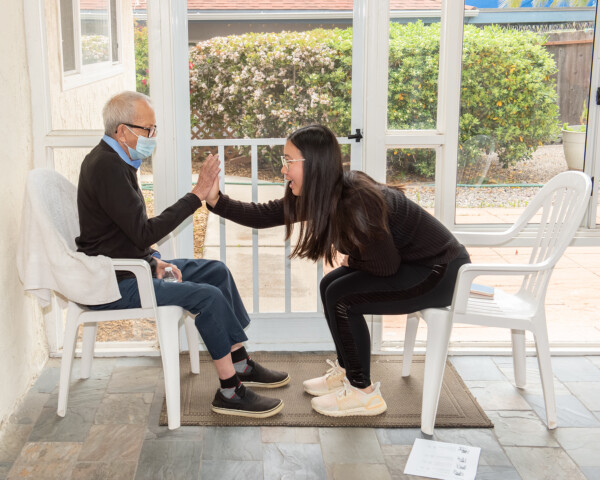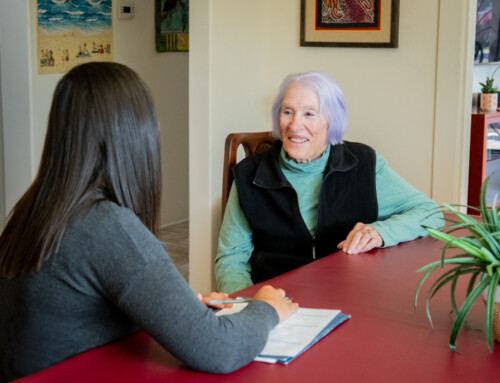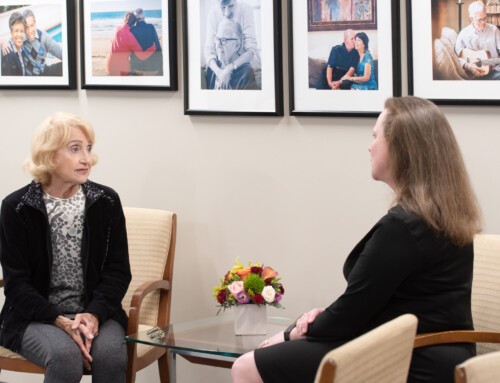
Dementia Care Coach Corner: Written by Alison Hranek, MSW
It’s a well said phrase in the dementia community that if you’ve met one person with dementia, you’ve met one person with dementia. We experience challenging dementia symptoms that make life more difficult for all involved. Receiving care can be scary or anxiety-provoking for many who are living with memory loss. These emotions can lead to challenging behavior such as resistance, combativeness, or confusion. The response we (the caregiver) give to the person living with brain changes can alter how the dementia care journey evolves. Here we will discuss de-escalating common dementia behaviors and how to redirect these unwanted behaviors.
The Why?
Most behaviors stem from environmental or internal stimuli. First, we can attempt to identify the source of the agitation or unwanted behavior. Put on your detective hat and take a step back to get curious about the situation. Is there an environmental or internal factor causing the unwanted behavior? What are they trying to do? Are they trying to communicate an unmet need? Take a deep breath and give yourself a moment to concentrate on the why.
Use Effective Communication
Our response to their challenging behavior can make a positive impact. Respond with a calm voice and relaxed body language. While reading the list below of common dementia symptoms, picture a specific incident with the person you care for. Do you have it in mind? Was the cause of their unwanted behavior environmental or internal? Can it be both? Yes it can! Does the person you care for experience sundowning? Any activities that are stressful should be scheduled in the morning when the person’s mind is clearer. There are many environmental reasons why someone will have an easier time in the afternoons, even with sundowning.
Common Symptoms
- Disorientation (obvious confusion to time/place)
- Sadness (verbal or physical cues)
- Anxiety (worried, restless or pacing)
- Wandering (leaving with no notice)
- Agitation/Anger (yells, fidgets, paces)
- Refusal to Complete a Task (meals/showers)
- Shadowing (following caregiver around)
- Sleep Disturbances (too little or too much sleep)
- Repeats Questions (Looping)
- Delusions (belief of a specific story that is untrue)
- Hallucinations (seeing or hearing things or people that are not there)
- Suspicion (suspects others of stealing)
- Paranoia (thinks neighbors are threatening, closes all blinds)
- Inappropriate Sexual Behavior (self touch or exposing in inappropriate settings)
- Rummaging or Hiding Items (misplaced items in inappropriate places)
What in the environment can be causing the disorientation? Respond with a calm tone and normal volume. Explain that they are safe and not alone. Focus on the next activity and try not to correct them if they are wrong. People living with dementia often mistake time / place / date. Unless there is a safety concern, we don’t need to correct them. Can there be a substitution for the unwanted behavior? It can be more effective to substitute something instead of saying no or taking something away.
From: 10 Ways to De-Escalate a Crisis with Teepa Snow
- Remove the threat
- Create space
- Be on their side (physically and in your tone of voice)
- Get at or below eye level
- Use “hand under hand”
- Breathe in sync
- Calm tone in your voice
- Relax your body
- Attend to their needs
- Be willing to go where they are (meet them where they are at physically and in your tone)
Redirecting someone away from some of these challenging behaviors can be tricky. It takes a lot of patience and persistence to be successful. We can help! Call one of our friendly Dementia Care Coaches at 858.492.4400 to discuss your situation and get relatable redirection ideas. We help San Diego County residents and/or those caring for someone living in San Diego County (Spanish speakers available). Also check out our free education classes, social activities, caregiver support groups, & more.
Our “Dementia Care Coach Corner” series is where our team of dementia experts weigh in on unique topics and provide insight that can help people impacted by dementia.
RECOMMENDED: How Young Advocates Are Revolutionizing Dementia Support
Posted on February 13th, 2025




